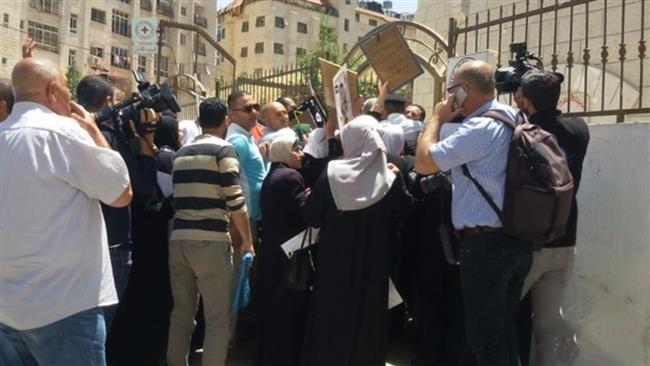
RNA - During a demonstration outside the ICRC office in the northern occupied West Bank city of Nablus on Monday, the protesters asked the Geneva-based humanitarian institution to “do its duty” and save the hunger strikers – many of whom are so emaciated that they cannot walk or stand, or are suffering from skin problems and constant vomiting.
Mothers of hunger strikers said they wanted the ICRC to take more concrete measures and expose “the oppressive practices inside Israeli jails.”
New Hamas leader expresses solidarity with Palestinian strikers
Meanwhile, the new chairman of Hamas political bureau says the Islamic resistance movement stands with Palestinian hunger strikers.
Speaking during a visit to a sit-in in solidarity with the prisoners in Gaza City on Monday, Ismail Haniyeh stated that “This visit is a message to our heroic prisoners that your cause has been and will remain a top priority for Hamas and Palestinian leadership under any circumstances.”
"Your freedom is a national duty and your dignity is our dignity,” he added.
Haniyeh stressed that the hunger-striking prisoners will eventually achieve their goals and aspirations through the struggle, calling on Palestinians from all walks of life to continue their rallies and sit-ins in solidarity with the prisoners until the occupying regime of Israel responds to their demands.
Since April 17, more than 1,600 Palestinian prisoners have joined the protest action, dubbed the Freedom and Dignity Strike, which was initially called by imprisoned and former Fatah movement leader Marwan Barghouti.
The strikers are demanding basic rights, such as an end to the policies of administrative detention, solitary confinement and deliberate medical negligence.
The much criticized administrative detention is a policy under which Palestinian inmates are kept in Israeli detention facilities without trial or charge.
Back in 2012, a similar hunger strike, involving some 2,000 Palestinian inmates, ended after an agreement was reached with Israeli authorities to terminate the policy of internment without trial or charge.
The Palestinian inmates regularly hold hunger strikes in protest against the administrative detention policy and their harsh prison conditions.
Nearly 700 prisoners are currently held in administrative detention. Some of the inmates have been held in prison under the policy for up to 11 years.
847/940